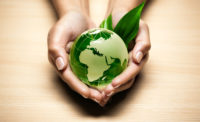Wacker Announces Ambitious New Sustainability Goals
Wacker is striving to ensure that its entire product portfolio meets defined sustainability criteria by 2030.

Wacker Chemie AG recently presented its new sustainable development goals to investors and analysts at an online Capital Market Day that took place December 16, 2021. Wacker reports that its new goals are much more ambitious than previous ones. For example, by 2030, the Munich-based chemical group now aims to cut its absolute greenhouse gas emissions by 50% relative to 2020.
Previously, Wacker had committed to reducing specific greenhouse gas emissions—i.e. per metric ton of product—by 33% relative to 2012. Wacker is striving to ensure that its entire product portfolio meets defined sustainability criteria by 2030 (previously: 90%). It also expects all its key suppliers to meet defined sustainability standards by 2030 (previously: 90%). During the same period, it expects a 25% drop in emissions relating to upstream products used by Wacker. A new goal refers to specific water withdrawal, which Wacker aims to reduce by 15% by 2030.
The new goals to cut greenhouse gases are so-called Science-Based Targets. In other words, they are consistent with the goal of keeping the global rise in temperature below 1.5°C and therefore comply with the Paris Agreement. Wacker has joined Race to Zero, the UN’s carbon neutrality initiative. The company is thus voluntarily committing to the 1.5° target and undertaking to issue transparent progress reports on its course toward climate neutrality, which it strives to achieve by 2045.
As Wacker CEO Christian Hartel spelled out, the company is following two strategic approaches to improving its own environmental footprint and making substantial contributions to limiting global warming. “First, we are working toward minimizing greenhouse gas emissions and consumption of resources for our own products and processes. At the same time—and we see this as an even bigger lever—our unique chemical products already play a decisive role in enabling our customers in a wide range of user industries to bring climate and resource-friendly solutions onto the market,” said Hartel. “Over the next few years, we want to considerably expand our portfolio of particularly sustainable products.”
Hartel suggested that the new sustainable development goals are ambitious. “We have spent the last few months scrutinizing our product portfolio and production processes. Our goals take us to the limit of what we consider to be technically feasible and achievable,” he emphasized.
Wacker reports that a great many of its products are used in key ways to combat climate change, such as thermally conductive specialty silicones for electric vehicles. Wacker also plays a crucial role in making the energy transition a success thanks to its polysilicon, the most important raw material for solar modules. According to Wacker, the amount of solar-grade silicon produced by the company in one year results in photovoltaic modules that avoid more than 450 million metric tons of CO2 annually. The company reports that this is equivalent to offsetting the annual emissions of a city the size of Hamburg, Germany, for 30 years. Wacker also supplies a host of products based on renewables, including silicone sealants made with plant-based methanol.
“However, our initiatives toward further improving the sustainability of our portfolio are not only a contribution to countering global warming, they are also a tremendous business opportunity for us,” said Hartel. According to Hartel, Wacker products that enable customers to launch climate-friendly and resource-efficient solutions make up about two thirds of the company’s overall portfolio. “As demand for such products continues to grow, we expect that they will develop to be among the most important drivers of our sales and earnings in the coming years,” he said.
Wacker is adopting defined projects and measures to meet its new goals. For example, it is currently working on specific concepts that will enable the Holla site in Norway to replace the coal that it currently uses for producing silicon metal with charcoal and other biomass obtained by sustainable means. Other Wacker projects are concerned with the value-adding potential of using CO2 as a raw material for chemical products. For instance, Wacker is planning to build a 20-megawatt electrolysis plant—known as RHYME Bavaria—at its Burghausen, Germany, site. This plant is intended to use renewable electricity to produce hydrogen, which, together with CO2 from existing production processes, is then converted into methanol in a synthesis plant.
Additional details about Wacker’s sustainability initiatives are available at www.wacker.com.
Looking for a reprint of this article?
From high-res PDFs to custom plaques, order your copy today!




